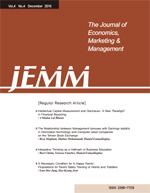Analysis of Trends in Elderly Welfare Research in South Korea based on BERTopic
- 국제융합경영학회
- 융합경영연구
- Vol.13 No.1
-
2025.0213 - 22 (10 pages)
-
DOI : 10.20482/jemm.2025.13.1.13
- 58

Purpose: This study aims to analyze the trends in elderly welfare research in South Korea from 1979 to 2024, using BERTopic, an advanced text-mining technique that facilitates the automatic extraction and visualization of research topics. The rapid aging of South Korea's population has resulted in social and healthcare challenges, making research on elderly welfare increasingly critical. Design/methodology/approach We collected English abstracts from the ScienceON database provided by the Korea Institute of Science and Technology Information (KISTI). BERTopic was applied to extract 28 initial topics, which were later clustered into eight major topics, including Social Care, Mental Health, and Welfare Systems. Linear regression analysis was also performed to determine hot and cold topics over time. Results: The findings indicate an increasing trend in research focusing on Social Care, Mental Health, and Welfare Systems, suggesting a shift in emphasis towards more integrated, community-based, and psychosocial approaches to elderly welfare. Topics such as Culture/Values, Nutrition/Health Management, and Facilities/Housing have declined in importance, indicating a change in focus from physical health management to mental and social well-being. Conclusions: The use of BERTopic allowed for a sophisticated and objective analysis of research trends in elderly welfare. Academically, the findings show that elderly welfare research has evolved from fragmented approaches to more integrated research covering social care and mental health. From a policy perspective, the findings confirm a paradigm shift from facility-based to community-based approaches, emphasizing the need for integrated care that includes mental and social well-being. This suggests that future policy development should prioritize resource allocation to social care and mental health support.
1. Introduction
2. Literature Review
3. Methods and Materials
4. Results and Discussion
5. Conclusions
References
(0)
(0)